Existing User Log In
New User Registration
Register for a free account to gain full access to the VGChartz Network and join our thriving community.



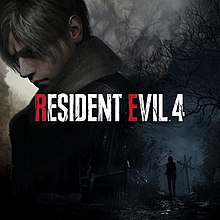

America - Front
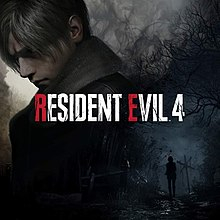

America - Back

As one of the few people in my grade who didn’t own a GameCube until well after its prime, I had to rely on my friends to play the latest and greatest on that system. Most of the time we played Super Smash Bros. Melee or Mario Kart: Double Dash, but one fateful day my friend brought a copy of Resident Evil 4. Though I would never admit it at the time, I was terrified to play this game. I’ve always had an intense adrenergic reaction to videogames. Even while playing Donkey Kong 64, I would stand up and tense my entire body when a beaver started chasing me. I tried to suggest that he play as I watch, to which he responded with a question no boy ever wants to hear: “what are you, chicken?”. Challenge accepted. I put the disk in, started up the console, and gripped the controller. I was going to show him that I’m fearless.
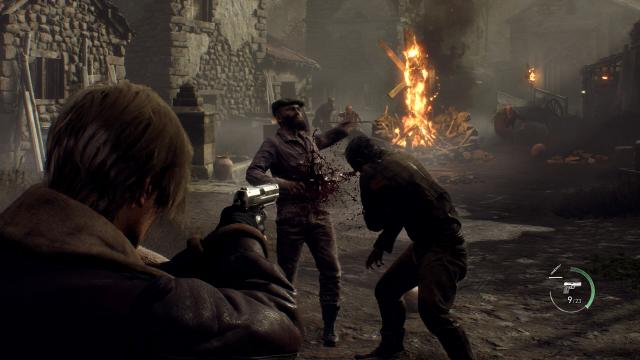
As the opening scene began, I was already in awe of the graphics. This was one of the most lifelike games I had ever seen up until that point. Having played and beaten it already, my friend promptly began to guide me through the opening. He told me to go into the house and warned me about the villager on the inside. A cut scene depicts a villager attempting to attack Leon, and when it ends, I quickly aim and shoot the villager a few times. The villager goes down and I feel triumph. “Maybe these horror games aren’t too scary”, I thought. Another cut scene ensues; the police officers I arrived with abandon me and villagers begin to surround the house. My friend directs me upstairs for a “trick” on how to deal with these villagers. He tells me to go upstairs and knife out the window, then start shooting at the villagers below. I go up stairs and…press the wrong button. Leon jumps out of the window instead. Panicked, I shout, asking what I’m supposed to do. He simply says “run”. So, that’s what I did. I got up, dropped the controller, and ran out of the room, leaving the game, my friend, and his never-ending chortles echoing behind me.
Embarrassment aside, I did eventually complete Resident Evil 4. Then I completed it again. And again. And again. I found out that there was a PS2 version with extra content, so I purchased that version and beat it several more times. When the HD remaster came to PS3, I purchased the game a third time and, once again, beat it several more times. Needless to say, the original Resident Evil 4 pushed me out of my comfort zone by introducing me to the horror genre. It’s a game that I consider one of the all-time greatest, and one I know like the back of my hand, making my reaction to the announcement and subsequent release of Resident Evil 4 remake a weird mix of both apprehension and anticipation.
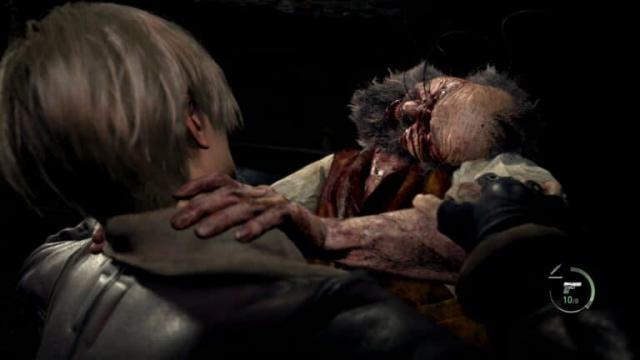
Though it follows not long after Capcom’s remakes of Resident Evil 2 and 3, this entry feels more akin to the Resident Evil 1 remake way back on the GameCube. Sure, it plays more like the more recent remakes, but the way the game uses your experience and knowledge of the previous title against you feels much more like the series' first remake. For example, a reanimated Ganado that attacks in the first house gives flashbacks to the Crimson Heads in the remake of Resident Evil 1. Where you expect the game to zig, it will now zag. Enemy placements, enemy types, level designs, tactics, tricks, items, and even story elements will be different at a moment's notice. Yet, never once did I feel like this wasn’t the Resident Evil 4 I knew. It’s comparable to going back to your hometown after a decade or more of being away. It’s all so familiar, but new buildings have been added, some old shops have closed, you don’t know everyone anymore, and you find yourself having to ask around to find places you could previously go blindfolded.
For those who may be new to Resident Evil, or simply didn't play the original entry for one reason or another, you may be wondering what this game even is. To put it simply, Resident Evil 4 is a third person action-horror title where you play as Leon S. Kennedy, who is sent to a village in Spain to rescue the president’s daughter. The original game is synonymous with establishing the over-the-shoulder camera style that's still being utilized to this day. This entry remakes that experience, but with modern influences that make it more approachable.
If you’ve played any of the prior remakes, this entry plays similarly to those, though Leon is a bit more aggressive in this game than he was in the Resident Evil 2 remake. You’ll find yourself headshotting Ganados, running up and kicking them, parrying an attack from a villager, and then knifing them in response in no time. Of course, fans will notice that some of these mechanics are new. Leon can now parry a variety of attacks and then counter to quickly dispatch an enemy. He can also use stealth to avoid enemy encounters or sneak up behind them and eliminate them entirely. Given the fact that ammo appears far more scarce in this version than the original, these are very welcome changes. Though there are sections that feel built or changed to support this mechanic, I never felt like using stealth was anything more than optional. Generally, Leon just feels much more nimble and natural in his movements.
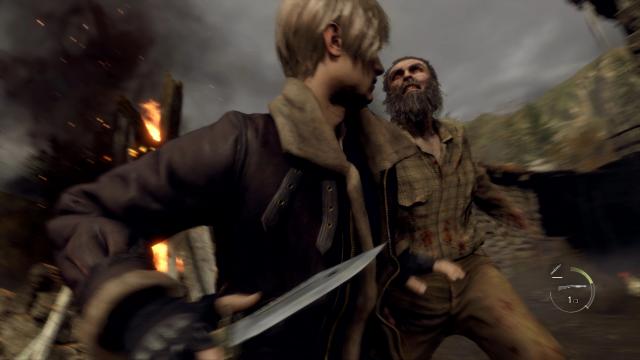
Though Leon may be more nimble and capable than ever before, there are other additions to the game that feel less like modernizing a classic experience and more about emphasizing the survival-horror aspect. Your knife is no longer indestructible, so you need to be more purposeful about when and where you use it. You can craft ammunition, but ammunition is far more scarce as well (as is health, for that matter). The enemy A.I. is much improved, and enemies appear to actually coordinate more (though some are still very much cannon fodder, as the name Ganado suggests). Enemies will swarm you as one focuses on taking Ashley away. Others may fake you out with their side stepping, or grab you to leave you open for another one of their friends to slice into you.
Their designs feel more horrific too. El Gigante appears mutilated and in pain, while still being as fearsome and daunting as before. The Rejuvenators feature a disturbing smile and piercing red eyes that feel as if they were ripped from your worst nightmares. Couple this with less ammo, less health, a darker and more gruesome atmosphere, and you have a game that feels more survival-horror than ever before. Overall, those who felt like Resident Evil 4 was the beginning of the franchise’s descent into an over-the-top action focus which resulted in overly-yoked men punching boulders in volcanos and “totally not superhumans” beating up a huge B.O.W. in hand-to-hand combat while surrounded by magma, then escaping on a rocket-propelled vehicle while glam rock music played in the background (yes, these things actually happened in series), will probably feel much more satisfied with the remake.
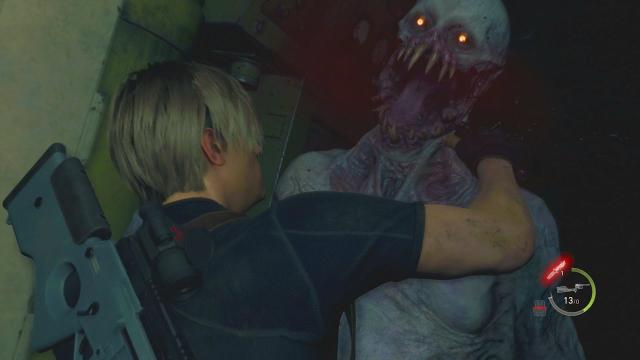
Other changes that are featured seem to simply be designed to improve the quality of life experience. Though I did weirdly enjoy playing Tetris with my attache case in the original, I found myself using the auto-sort function more often than not. An auto-save and checkpoint system prevent accidental deaths sending you way back to the last typewriter (except on Professional difficulty). Ashley no longer has a separate health bar (which means you don’t have to waste precious herbs to keep her alive), and is more capable of not getting kidnapped by Las Plagas. Simple yellow paint marks interactable or destructible objects, replacing a role the laser sight took on in the original. The second half of the game feels much less rushed than the original too, with added set pieces and boss encounters to shake up the experience.
Capcom even revamped the shooting range, which now gives you silver and gold coins to gamble on attache case customizations that grant minor bonuses. These range from increasing the amount of money given from selling ammunition to improving your running speed. The attache case itself features its own properties, and new attache cases can be purchased that provide different bonuses. All of these changes are done very tastefully, and provide updates to a classic game without taking away from the original feel.
The developers at Capcom also opted to expand upon the original, not just retell it. Though the overall level layout is incredibly similar, it’s bigger and feels more interconnected. The lake, for example, can now be explored in its entirety. You can ride the boat to several areas that were never present in the original, and find hidden items, treasures, and even a weapon. To accompany these expansions, RE 4 remake offers a variety of incentives to explore. Of course, looking for treasure, ammunition, herbs, and the like are always good reasons, but the game goes one further: side quests. Sure, the original release had some side quest-esque sections with the blue medallions (which make their return, of course), but this goes slightly beyond that. Some side quests ask you to play pest control, finding vermin to exterminate or even a super powered Las Plagas infestation, whereas others may ask you to find and sell certain rare resources. Regardless, the reward is always the same: spinels, which are now used to trade for weapons, maps, or treasure instead of just selling.
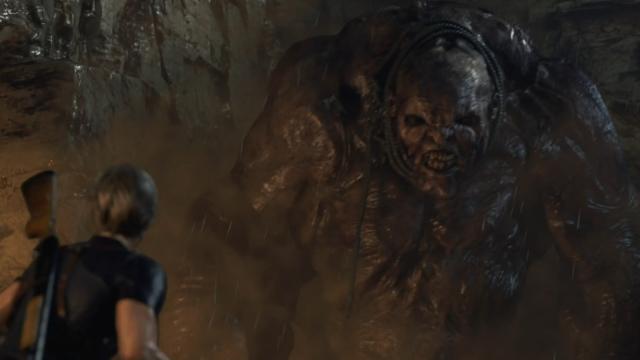
Most characters have been expanded on in subtle ways as well. Though Leon is, for the most part, still his sarcastic yet confident self, the side cast of characters have more thought put into them than before. Krauser can be seen as early as the first cut scene and his relationship is fleshed out a bit earlier in the game, providing greater continuity for when he shows up later on. Ashley Graham is given a bigger role than just damsel in distress, though she is definitely still filling the role of the princess to rescue overall. Even the merchant has more lines of dialogue. This isn’t just a game about Leon anymore, but about a whole cast of characters who have their own backstories and personalities.
Though the voice actors have all changed, I feel like they mostly did a great job of emulating the best parts of the original voices without recreating their weaknesses. In particular, Nick Apostolides, the voice actor for Leon, delivers a solid performance as a more experienced Leon since Resident Evil 2 remake, continuing the original's sarcastic one-liners while providing more seriousness when needed. The voice actor for Ashley Graham, Genevieve Buechner, sounds much more like an adult woman in a desperate situation than a lost little girl waiting to be rescued. Not all of the performances are improvements, however. In particular, Ada Wong's voice acting sounds rather stilted in comparison to the other actors. Still, as a whole the voices are an improvement to the original game, and accompany the subtle story changes and personality updates to create more likeable and realistic characters.
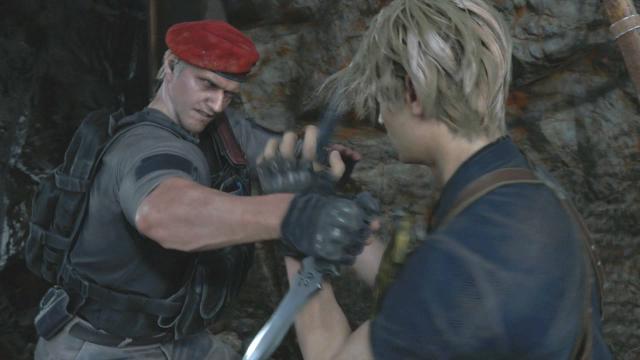
Graphically, the game is very impressive. The RE Engine that Capcom uses is constantly being refined, and this is probably the best that Resident Evil has ever looked. Capcom has implemented a “strand” system, which individualizes each strand of Leon’s gorgeous head of boy-band hair. The issue is that, once again, we have a PC release that features incredibly poor graphics options, or, rather, incredibly poor optimization on graphics options. Texture quality doesn’t provide uniform improvements, but still has universal impact. FSR 1 and 2 don’t provide the performance increase that you’d typically associate with them, and actually creates a lot of visual noise. Ray tracing, while functional, actually creates crashes if your utilized VRAM gets too high. Of course, when all of these things are on you're met with an incredible-looking experience, but one that simply doesn’t run well on anything but the best hardware available. I’d love to praise Capcom on the graphics across the board, but the performance and optimization leaves a lot to be desired.
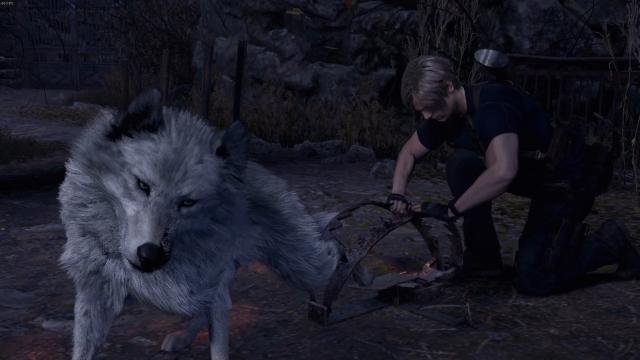
There really isn’t much to say negatively about the game as a whole though, even when compared to its genre-defining original release. Sure, there are a few things that I may miss about the original, such as the tricks I've grown accustom to or the red-dot sight (which isn't missing, just not given to you by default). However, with updated mechanics, a greater emphasis on survival-horror, more believable and fleshed out characters, and improved graphics, I don’t have a good reason not to treat this as the definitive Resident Evil 4 experience. The only major flaws are Capcom failing to include the extra content featured in the PS2 version (though, given my issues with the voice acting of Ada maybe this is a good thing) and poor optimization. In total, it does everything that the original release did, but better, and produces an expanded experience with additional incentives which provide even greater replay value. Recreating a much-beloved game like Resident Evil 4 while satisfying both fans of the original and improving upon the game for new audiences is no easy task, but, luckily, Capcom nailed it.









